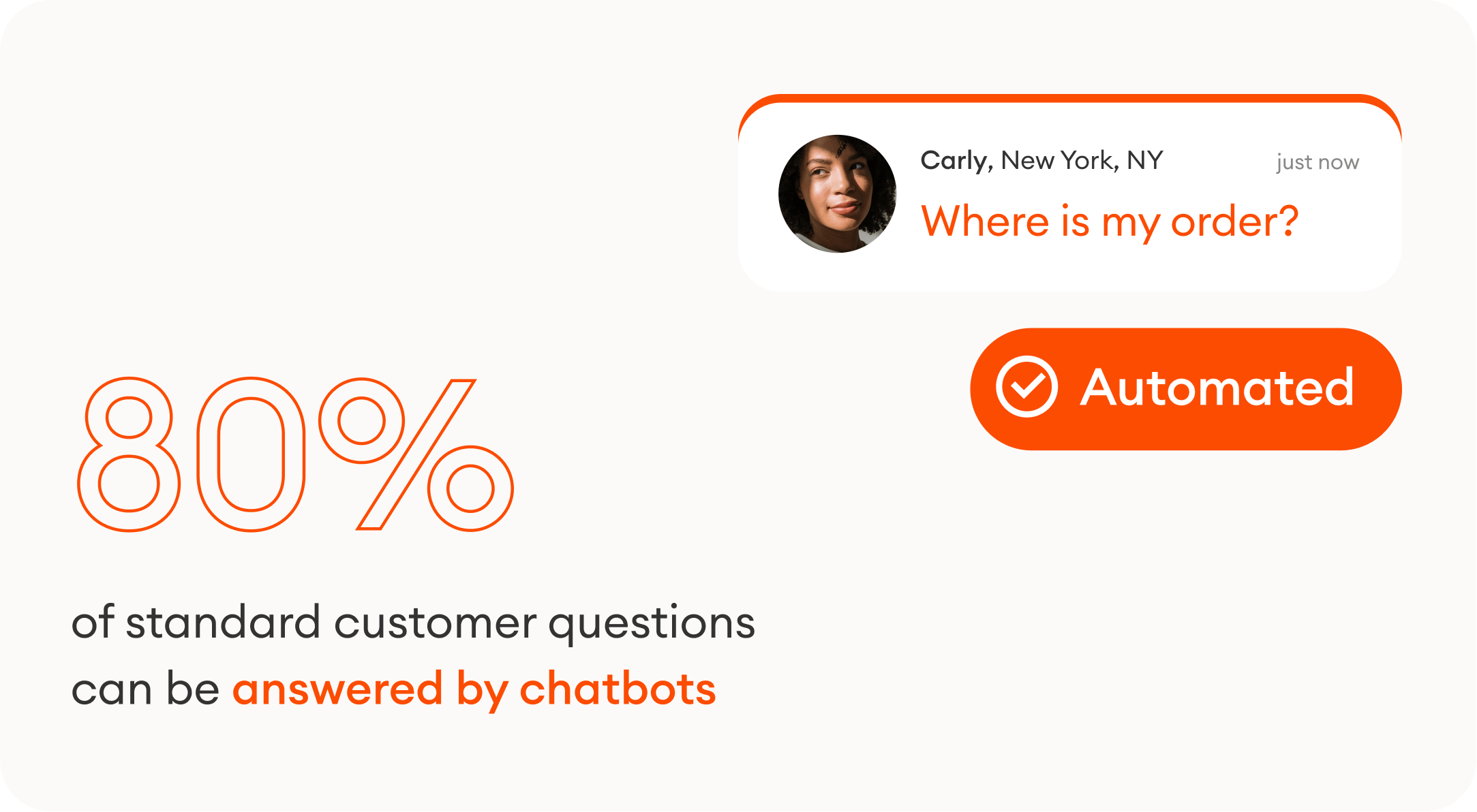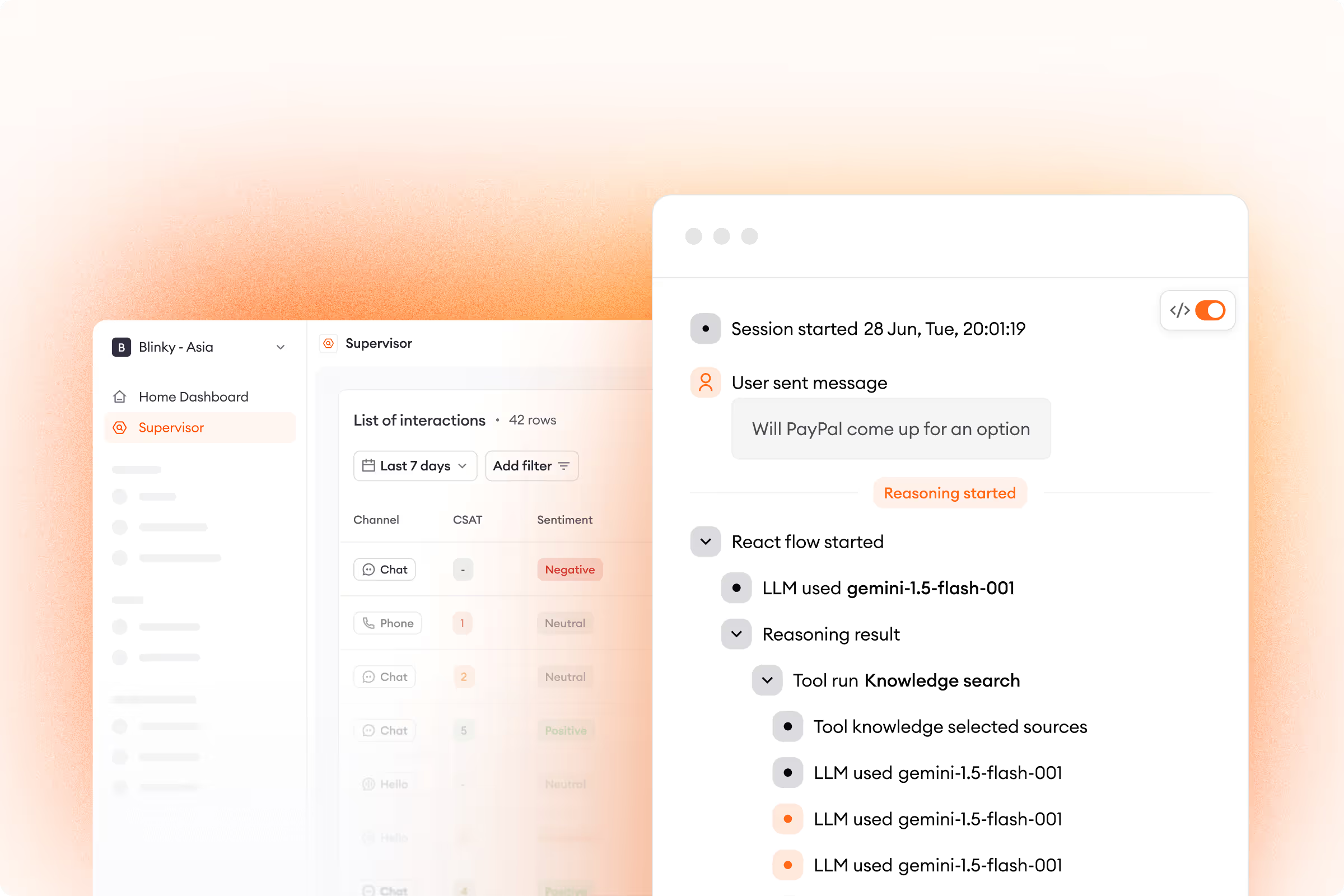Are you worried chatbots will hurt your customer service agents?
You might be apprehensive they’ll overwhelm your team with tickets, disrupt workflows, and give incorrect answers. All of these can contribute to a negative brand experience.
If you’re concerned about these effects—don’t be.
Automation brings brands all kinds of benefits. It can even give them better customer service agents.
Why is automation good for human agents? Let’s go through the reasons.
1. Automation boosts agent productivity

An IBM report found that chatbots can answer 80% of standard customer questions.
This is great news for customers. They’ll instantly get answers to their most common queries.
How does it help customer service agents?
It lightens their workload.
Without a chatbot, agents spend most of their time handling simple queries that don’t put their skills to good use. For ecommerce brands, these are questions like “Where is my order?” and “How much is shipping?”
Questions like these can easily overload agents. This stressful and unstimulating work is one reason why up to 20% of customer service representatives quit within the first 45 days.
With automation, agents won’t see the bulk of these questions. They’ll be able to focus on complex queries that require their expertise.
How does this make agents more productive?
They’re now free to do in-depth research on a specific customer’s case, refine their skills, and learn about their brand to give better answers moving forward.
2. Automation saves agents time

Another benefit of chatbots is that they bring efficiency to both customers and customer service agents.
In 2020, the average response time for any query asked over live chat was 88 seconds. If we’re talking about email, it typically takes 12 hours for customers to get an answer.
With automation, the response is immediate.
Studies show chatbots reduce resolution times by 30%.
Shorter response times mean more free time for agents. Why is this free time so important?
Nearly 75% of customer service agents are at risk of burning out.
By giving agents breathing room, companies are helping out their well-being. And according to Harvard Business Review, happy customer service agents boost customer satisfaction.
Zowie saves ecommerce brands 2 hours a day per agent. To see how, check out our customer case study, UMZU Supplements Ecommerce Surge with Zowie.
3. Automation lets agents deliver a personalized experience
Customers are demanding personalization. Over 90% of shoppers say they’re more likely to buy from a brand that delivers personalized service.
They want companies to recognize them, remember their names and purchase history, and make relevant recommendations.
That’s exactly what chatbots do.
Today’s best chatbots are constantly learning and have no problem remembering a returning customer’s data. They’re able to recommend products based on a user’s preferences and chat history.
These personalized suggestions can have a major impact on a business’s online sales.

How does this help agents?
One-third of customers say having to repeat themselves to different support agents is the most frustrating thing about customer service.
Personalized automation removes this problem.
If a chat needs to be handed over to a human, the agent has instant access to any information a customer already entered—their name, their likes/dislikes, and the reason they’re reaching out to customer service.
With this data, agents can resolve chats much more effectively. If customer service agents are empowered to perform better, they’ll feel more satisfied at work. Giving customers the personalized treatment they want leads to more positive interactions, which can raise agent happiness as well.
4. Automation doesn’t put customer service jobs at risk

Many agents mistakenly see automation as a threat.
"If a chatbot handles more chats than me, I’ll lose my job!"
In practice, this simply doesn’t happen.
According to Accenture, a chatbot has a minimal impact on a company’s headcount.
On a wider scale, Gartner found that AI has had a net positive impact on employment since 2020. And the World Economic Forum predicts AI will create 97M jobs by 2025.
Chatbots can create new, engaging jobs in customer service.
They also enable rapid online growth. With more orders, the number of complex cases that require human-to-human interaction increases.
Having human agents collaborate with chatbots often yields the best results.
For instance, when sporting goods retailer Decathlon turned to automation in 2018, they wanted their chatbot to focus only on standard questions. Customers looking for sports advice were redirected to a human so agents could show off their passion for sports whenever possible.
To learn about the different ways customer service automation can generate revenue, read our “Grow Your Ecommerce Sales” blog post.
Chatbots help your brand, your customers, and your agents
The future of customer service isn’t bots vs. agents. It’s bots enabling agents to perform more rewarding and innovative tasks.
The data is clear—brands that turn to customer service automation see a host of benefits. Agents are more productive, customer satisfaction rises, and revenues increase.
If you’re an ecommerce brand experiencing high growth, you can drive sales from customer service with Zowie.
Book a call.
.avif)

.avif)
.svg)







